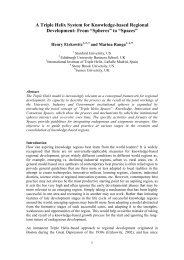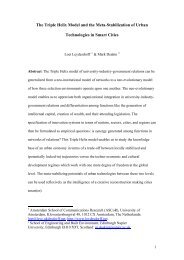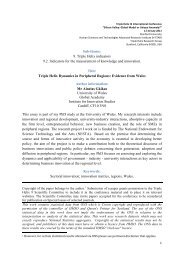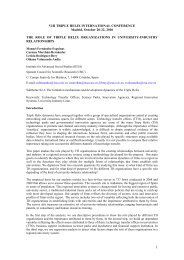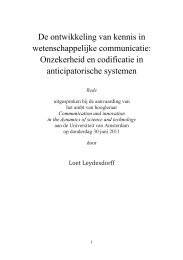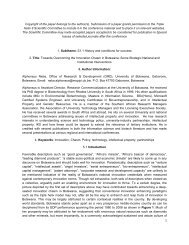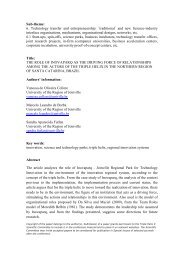TRIPLE HELIX noms.pmd
TRIPLE HELIX noms.pmd
TRIPLE HELIX noms.pmd
You also want an ePaper? Increase the reach of your titles
YUMPU automatically turns print PDFs into web optimized ePapers that Google loves.
O-127THE ROLE OF BRAZILIAN UNIVERSITIES IN THE KNOWLEDGE GOVERNANCE:AN EXPLORATORY STUDYGustavo Souza, UFRRJ - Universidade Federal Rural do Rio de Janeiro, BrazilBiancca Castro, UNICAMP - Universidade de Campinas, BrazilAndré Ferreira, UFF - Universidade Federal Fluminense, BrazilMarco Souza, UFRRJ - Universidade Federal Rural do Rio de Janeiro, BrazilThe role of universities has changed considerably over the centuries. Presently they are recognized as loci of professionalqualification, scientific discovery and dissemination of knowledge in society, having thus a triple role. According to Cooke(2006), universities have become key factors in the process of mobilization and transfer of knowledge, moving from a narrow roleof supplier of skilled workers to become more engaged in supporting innovation.In Brazil, there is an increase of the universities participation in scientific and technological development. While throughout the1990s they were responsible for 355 requests of patents at the National Institute of Industrial Property (INPI), between 2000 and2004, there were 784 requests, which are, however, 2,22% of deposits of residents and only 0.78% of total general requests inthe period. Reports from INPI suggest that the creation of Foundations for Research Support, the installation and improvementof centers of technological innovation in universities, in addition to the promulgation of the laws 10.973/04 (Law of Innovation)and 11.196/05 (Law of Goodness), may have encouraged the development of a culture of innovation and intellectual property inthe country.If, on the one hand, the role of universities in the development of innovations has increased in recent years, on the other, no oneknows exactly what has been done from the innovations developed. Questions about the commercial exploitation of technologicalinnovations patented by the Brazilian universities; the benefits that are reverted to them; the partnerships with private companiesand research institutes, among others, have not been analyzed yet. The purpose of this article is to enlighten these issues.STATE OF THE ARTAccording to Etzkowitz and Leydesdorff (2000), the increased importance of knowledge and research for the economy hasuncharged the university with the challenge of promoting the economic and social development. Thus, an academic revolutionhas began (Etzkowitz, 2008), making the mission of the university, previously restricted to conservation and creation of knowledge(education and research), become the application of this knowledge (entrepreneurship).But the innovation process is not complete without the participation of the firms which, according to Cruz and Pacheco (2009)have an essential role in the generation of innovation. In this context, there are several possibilities to transfer the knowledgegenerated by the University to society: one is, according to Etzkowitz (2008), the university substitutes the enterprises tosupport the formation of firms and technology transfer, without being an enterprise, as it occurs in incubators and science parks.Another possibility is to set up offices of technology transfer to facilitate the commercialization of research: in the U.S., patentsand licenses based on academic findings represent more than $ 40 billion and more than 300 companies were created baseddirectly on academic research in 1999. Thus, it is relevant to understand the strategies that Brazilian universities have adoptedto transform knowledge and research results into innovation and how this knowledge has been appropriated.FOCUS OF THE RESEARCHThis research aims to investigate the commercial exploitation of patents owned by most innovative universities in Brazil and thebenefits that accrue from those patents to those universities. From data analysis and interviews we seek to point out what arethe main partners of the universities, both in the process of creation as in the moment of commercialization of knowledge andinnovation generated. In addition, we analyze the changes that may be occurring in the role of Brazilian universities because ofthose activities.METHODOLOGYFor this research, we selected the five most innovative Brazilian universities in the last 10 years: State University of Campinas,Federal University of Minas Gerais, Federal University of Rio de Janeiro, Federal University of São Paulo and Federal Universityof Rio Grande do Sul. Then we investigated their innovation agencies and the research groups that produced more innovationsin recent years.We have made interviews with their coordinators in order to understand the process of forming knowledge, pointing out thecharacteristics of the research groups, its funders and partners, but focusing the investigation mainly on the cases of commercialexploitation of their innovations. So, we aimed to know those who have benefited from the innovations generated, peopleresponsible for the commercialization, and the financial or non-financial rewards which are with the University.CONTRIBUTIONS AND IMPLICATIONSThis research aims to contribute to the formulation of public policies for the development and diffusion of technological innovationsby Brazilian universities, especially regarded to the commercial exploitation of their patents. We intend to analyze precisely theprocess of introducing innovations on society. The research also provides subsidies for the development of public-privatepartnerships for the development of innovation and knowledge management. Finally, it enlightens the changes in the role ofMadrid, October 20, 21 & 22 - 2010318



